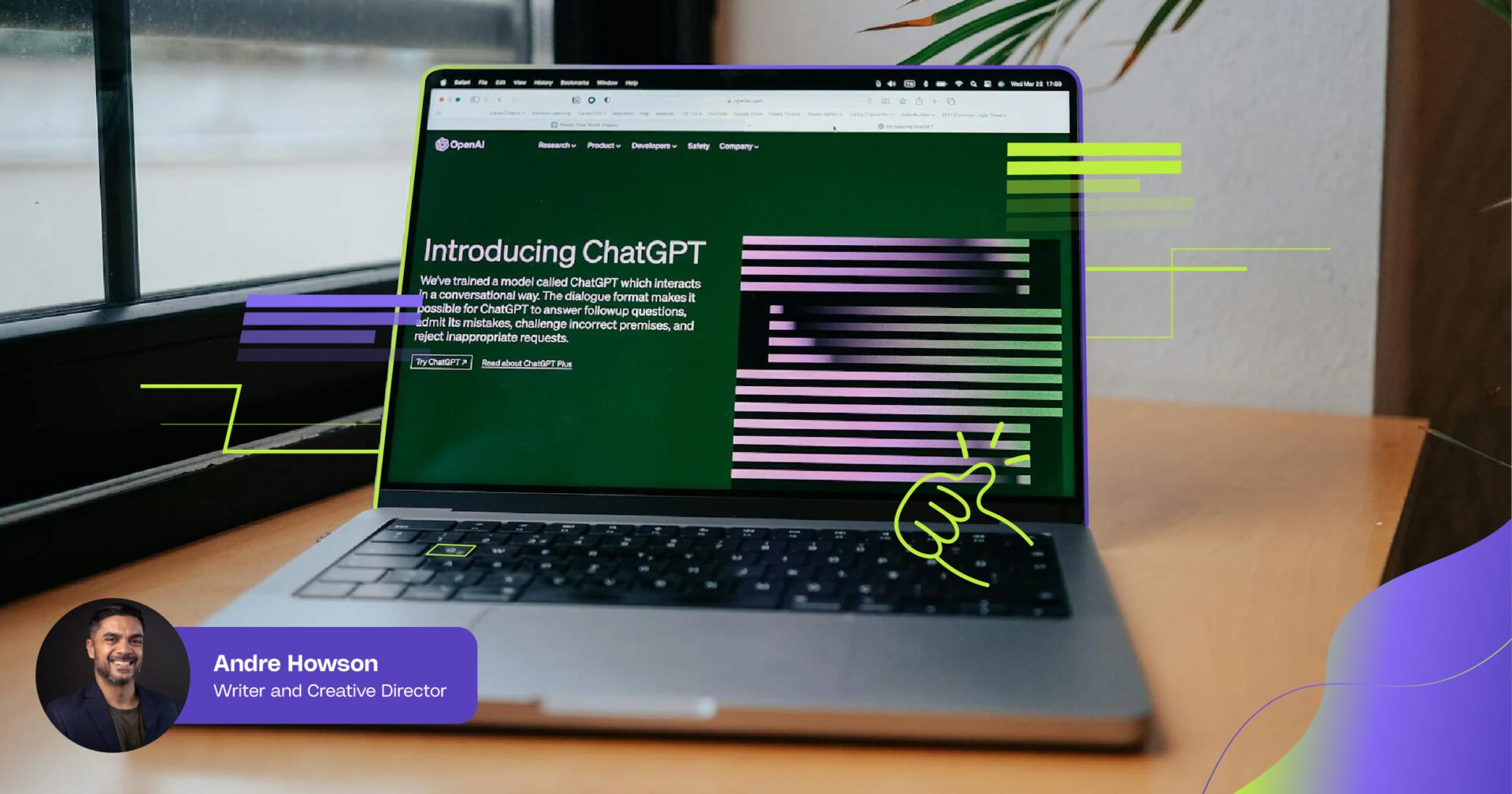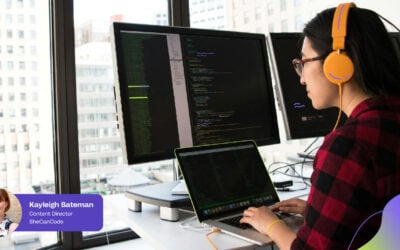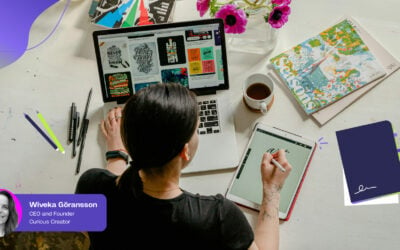
Artificial Intelligence (AI) has rapidly integrated into our daily routines, ushering in significant changes across various industries. From automating mundane tasks to enhancing creative processes, AI’s influence is undeniable. But what does this mean for the future of work and human creativity? What jobs will AI replace in the near future—if any at all?
We sat down with Andre Howson, an experienced Writer and Creative Director at content marketing agency Click2View, to understand how he views the AI revolution as a leader and creative caught between both sides of the discourse.
Why are we so afraid?
Firstly, the simplest explanation is that change is scary. We humans, with our beautifully complex brains, have a natural aversion to uncertainty (for good reason). The thing about any technological boom is that it’s always uncertain how we’ll handle it, which brings us to a more complicated explanation.
People are afraid that companies want to replace their workers en masse with AI tools, making them instantly redundant.
According to a Harvard Business Review article, ‘Companies That Replace People with AI Will Get Left Behind’, we’re likely to experience short-term job displacement, as opposed to large-scale and permanent job loss.
It states: “Historically, we’ve never experienced macro-level unemployment from new technologies, so AI is unlikely to make many people jobless in the long term — especially since most advanced countries are now seeing their working-age populations decline. However, because companies are adopting ChatGPT and other generative AI remarkably fast, we may see substantial job displacement in the short term.”
The question then becomes, what will we do in the short term and how can we prepare? What mechanisms will we adopt to allay the negative impacts? As we’re still quite early in the timeline of AI’s capability, it’s clear that this conversation is still developing—we have no definitive answers. What we can do is take a look at how the creative industry, which has seen a massive explosion of AI over the past year, and see how it’s coping today.
Adapting to changes
In 2023, we took a glimpse into the future of creative work in the age of AI, where we spoke about how, historically, technology has been a force that has challenged and reshaped human creativity. Does this still ring true?
Andre Howson believes so. Over the course of his career as a creative, Andre has had to adapt to shifting tides. Starting out, he initially tried out corporate life before ending up in television (TV), only to quickly find out it didn’t suit him.
“I ended up in television (TV)—very classic, old-fashioned TV. I worked in a TV studio for about a year and a half, and it was just too much. I did what any millennial would do. I quit, bought a laptop and started travelling,” he said.
“What I did was, I started writing about travel. I figured, since I was travelling so much anyway, I’ll write about it. Then I found this great up-and-coming new content company called Roar and I asked them if they needed travel articles. I used to submit travel articles and they would publish them. It was fantastic.”
Andre then transitioned into creative writing and digital media, working full-time at Roar before, eventually becoming Creative Director, managing in-house production. At the time, AI was still slow-crawling it’s way into office rooms across the planet.
“I’ve been in the digital space for a bit, so I’ve seen quite several changes and shifts,” he explained, referencing how society adapted to the advent of the internet and how quickly new avenues opened up through social media.
“When it comes to creating content for people, the fact that we switched from mainly radio and television to the internet and social media was a huge change. When AI came about—this huge, scary and exciting thing—it came down to how people recognise and try to deal with it.”
What was the reaction to AI?
When the AI conversation finally hit the offices, there was a somewhat distinct split between initial reactions.
“As to how people viewed it when it first came, it was exciting to some, mostly upper-level management, and was scary to others, mostly creatives,” Andre explained. “For the first month or two, everyone was just making predictions at a rate.
“People predicted that the potential was there to just cut your staff by half and double the resources. ‘AI can just do so much. They can do your presentations, your video, your writing, and your editing. What do you need people for?’ But down the line, we still need people. We’re still using people because AI couldn’t fulfil half the promises people thought it could.”
Certain jobs, like low-quality SEO content generation, are easily replaceable by AI, Andre added.
“Those kind of jobs are easily replaceable. Can AI do press releases? Pretty easily. Do you want to create a job out of writing press releases? You shouldn’t,” he said, while noting that AI cannot replicate the creative essence of a writer’s job.
AI has several practical applications, like automated transcription, generating images for pitches, and editing and extending videos. Andre emphasised that while AI has made a lot of things possible—faster and more efficient—it hasn’t replaced anything yet.
Are AI misconceptions to blame?
The fear of job displacement by emerging technologies isn’t new. Throughout history, technological advancements have consistently disrupted labour markets. From the Industrial Revolution’s mechanisation to the advent of computers, each leap forward has sparked concerns about job loss. We’ve seen it with Photoshop, for example, when everyone was convinced it would permanently put traditional artistry out of business.
However, these fears have often been counterbalanced by the creation of new industries and roles. The emergence of AI, though, brings a unique challenge due to its potential to perform cognitive tasks—something we haven’t had to contend with before.
There’s a lot of fear-mongering, stating that people need to learn to command AI if they want their careers to survive. This may become a significant part of our future work, but the scale of its influence on all roles have been largely contested.
Many believe that the diversification period following the AI boom will lead to human creativity at a level we can’t presently comprehend. What we actually have to deal with now is figuring out the right balance between human and machine.
“Humans are infinitely creative creatures. We’re infinitely adaptable creatures, right? Nothing can be as creative as a human being. Machines can’t do it. Will AI foster creativity? No, you need to have good individuals—intelligent, skilled, capable, and give them space. They (the individuals) will foster creativity,” Andre said.
If AI won’t foster creativity, will it then enable a broader aspect of creativity instead? Andre says yes. “When talking about how people weren’t feeling like leadership or management valued their creativity, that’s how AI can work for these people as opposed to for corporations, because technically it’s a creator economy.”
“Look around you, the things that are making business sense—that are making money—are individual creators. If you don’t think they value you … you can literally become a one-person production team. You have all the tools available to you … you don’t even need to take photographs, you can generate them. Create content all by yourself.”
The world is opening up to a new reality and Andre believes there’s a significant opening in this huge and still-evolving market. “You can do absolutely anything you want right now, and it’s just getting better and better for individual creators. So, will AI foster creativity in an organisation? No. Will it enable you to be a lot more creative and take on ownership of everything? Fantastically.”
So, what jobs will AI replace?
The jobs that will most likely vanish are the jobs that don’t require human involvement. For example, there’s a reason we don’t really see elevator operators anymore. We’ll inevitably see some short-term impacts on jobs in certain fields, but avenues will open up in more convoluted ways.
At the end of the day, the goal of creating AI has always been to aid humanity—to reduce the menial tasks and free up our time to do more of the fun stuff. That’s the painting, the writing, the music—parts that usually categorise the joyful and creative aspects of being human. The issue right now is that for many, these aren’t hobbies—they’re actual careers that pay the bills.
AI’s doing all the painting, writing and music—and a few people are uncomfortable witnessing this phenomenon.
With a lot of the current focus being on the creative aspect of things, it could feel like we’re losing sight of the original goal: to use AI to better human life. The most important benefit to humanity that we hope to experience in the future is AI managing the increasing complexity of our society by simplifying increasingly intricate systems.
“AI can number crunch. It can explain. It can analyse a lot faster than we could ourselves,” Andre explained. This potential for reducing societal risks is one of AI’s most significant benefits.
For these reasons, we can expect AI’s influence on our lives to grow—but what happens next? Where do we go from here? Look at content creation—a field currently experiencing many changes through rapid AI integration. Is the future of content creation looking bleak?
“AI is going to create content, we can’t help it. But then it becomes a question of branding and marketing. Right now, you would probably pay a premium—most people do—for a pair of handmade leather shoes from Japan, as opposed to a pair of factory-made shoes from China. It’s branding, handmade. Imagine if you brand certain things,” Andre illustrated.
He explained that in the future, branding our creations as ‘human-made’ could add significant value to our work.
“A non-AI book, written by human; clothes, hand-stitched, hand-produced or hand-woven. You could brand things to make it special. That would be a premium and you’d have people support you for an actual human creative thing as opposed to a mass-generated product.”
“But I’m still worried about AI”
If you’re still worried about AI potentially erasing your job, Andre’s unconventional perspective might help you view things differently. “Imagine what will happen if everything breaks. How would you manage life?” he asked.
“The life we live now is layers upon layers upon layers of complexity that we built for ourselves. Most people spend four, six to eight hours online. It sometimes feels to people that life is lived online. This worry about AI, machine learning and losing jobs is all based on a technological society we’ve built that could be brought down by one power outage. Your power plant goes, you have no batteries, Elon Musk doesn’t give you internet. What are you going to do? We’ve been through COVID, where we’ve had rapid lifestyle changes. Things we thought we believed in, systems we trusted just stopped.”
Fear often comes from a lack of understanding. We think about theories of AI enforcing tyrannical control on humans, and it fuels that fear—but reality is rarely as dramatic as the movies.
AI might shake things up a bit. Some jobs might change, or even disappear. History has shown us time and time again that with every revolution comes new opportunities.
The future promises a symbiotic relationship between humans and AI, where technology uplifts human workers and enriches our creative endeavours. We just need to ensure that we guide it in ways that enable this reality. We’re on the brink of a whole new chapter in human history.
If you’re looking to kick off your career the right way this year, book a call with us. Let’s talk about it! You can also subscribe to our newsletter for the latest career information, tips, and updates. (They’re both completely free!)



